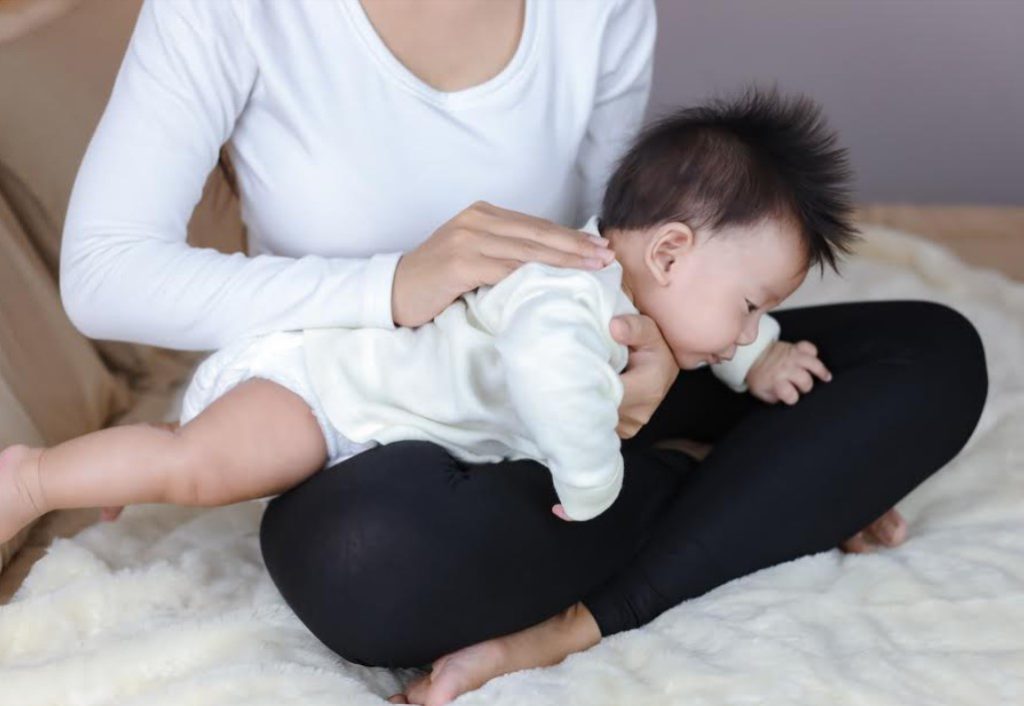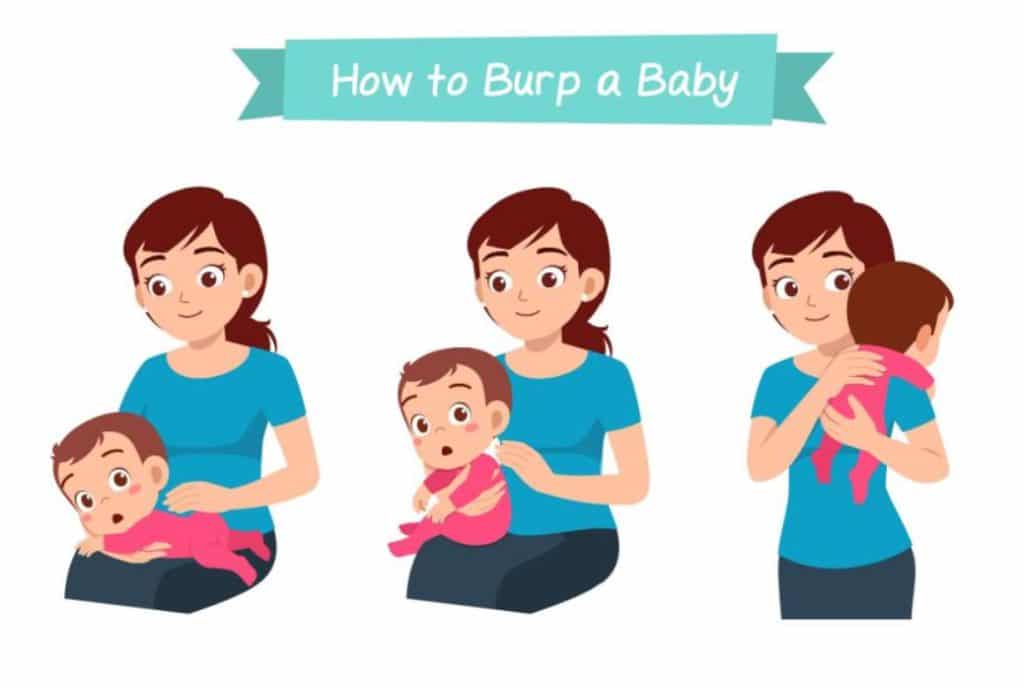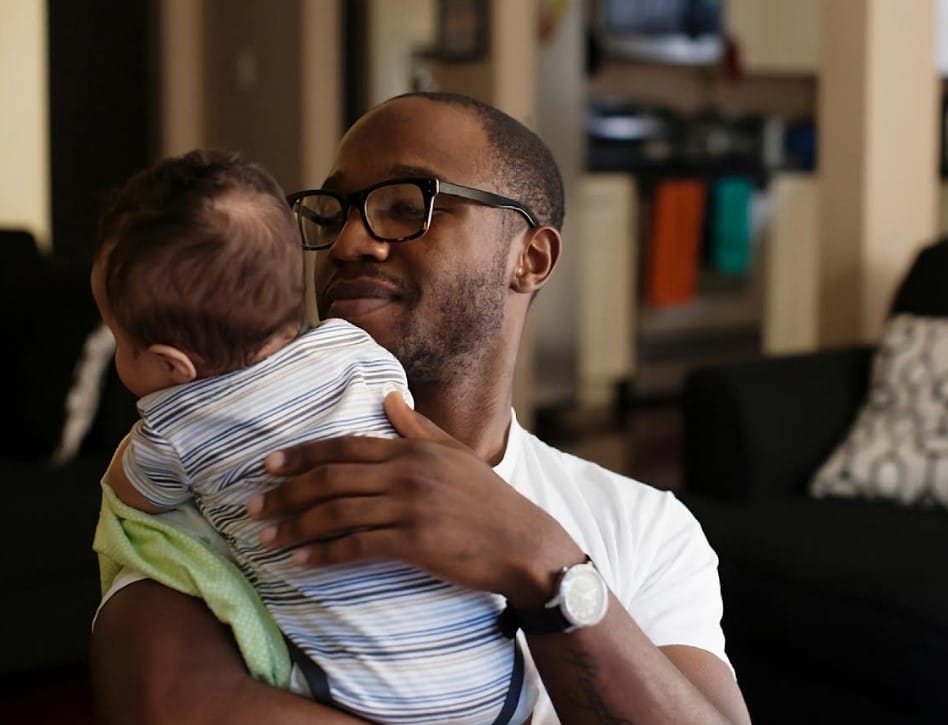Watching your little one grow is one of the most exciting feelings in the world. From watching the first smile to hearing the first giggle, the list is almost endless. Furthermore, another milestone on this journey is knowing when to stop burping your baby.
In this article, we’ve reviewed why babies burp, when to burp your baby, and the tell-tale signs that show when a baby needs a burp.
Keep reading to learn more.

Why Do Babies Burp?
It’s crucial that babies burp often after consuming a considerable amount of breastmilk or infant formula. This is because babies can get severe wind if they ingest air during meals.
Furthermore, when gas bubbles become lodged in a baby’s tummy, he or she may cry a lot due to the discomfort that comes with this.
When Do You Burp Your Baby?
Burping is most helpful during the first two to three months of your baby’s life. As we mentioned earlier, the best time to burp your little one is just after he or she has consumed a considerable amount of breastmilk or formula.
Also, it is helpful to continue burping formula-fed babies until they can burp on their own, which is usually around 6 to 9 months old. This is because formula-fed babies tend to swallow more air while eating than breastfed babies.
When Should You Stop Burping A Baby?
There is no specific age to stop burping your baby. However, most people tend to stop burping babies after the first four to six months of life.
Once your baby can move (sit up, roll over), burping may no longer be necessary. In fact, at this age, there is a high chance that he or she may be able to burp as air mobilization occurs with movement.
However, every baby is different; some may need to be burped for longer or shorter periods. Trust your instincts and continue burping your baby until they seem comfortable and relaxed.
Signs That Your Baby Needs To Be Burped
Your baby may exhibit unique signs indicating the need to burp as he or she develops.
Some babies become restless, curl their legs towards their chest, or make unusual facial expressions. Additionally, babies display several familiar cues when they require burping.
Thankfully, as a parent, you can look out for these four telltale signs that indicate their baby is ready to be burped:
- Crying or fussiness
- Not feeding comfortably
- Difficulty latching
- Pulling away from the bottle and breast
How to burp your baby
There are three popular burping methods for babies:
- Over the Shoulder:
Place your baby’s tummy over your shoulder with their chin resting on it (if they can support their head), or let their headrest. This method provides counter-pressure on the baby’s belly and is helpful for newborns or babies who spit up frequently.

- Sitting Up:
Hold your baby upright on your lap, using a “c-hold” around their jaw and underneath their ears for head support. Lean them slightly forward and give firm pats on their upper back to help them burp.
- Laying on Lap:
Lay your baby on their stomach across your lap and pat their back. You can support their head with your free hand if needed, but note that this method can lead to more vomiting, and some babies may not like it.
Remember to have a burp cloth handy in case of spit-ups!
What if Burping Isn’t Enough?
Burping your baby might not always be sufficient to ease their discomfort. There are many other options besides burping that you can try if your baby appears to be uncomfortable due to gas.
Here are a few options to try:
Bicycle their legs
Gas can be expelled by laying your child on their back and having them pedal their legs like a bicycle. (Poop may occasionally escape using this method if your child tries to push it out!)
Baby massage
According to proponents of the practice, infants’ circulatory and digestive systems may be improved by massaging them, which may help with gas and constipation. Nevertheless, there is little scientific evidence to support these claims.
Even if this isn’t the perfect fix, Massage can be a very calming experience for parents and babies, even if it isn’t the perfect cure for your child’s problems. Nothing strengthens your relationship with your child like touch!

Change the bottle’s nipple flow.
Nipple size may be causing your baby to inhale more air if you feed them from a bottle. Your baby may be gasping for air or squeezing extra air from the bottle due to a nipple that is releasing milk too quickly or slowly.
You might notice your baby begins to feel a little better after increasing or decreasing the nipple size.
Use premixed formula
Changing formulas might be worth a shot if your child’s stomach always seems hurt. Sometimes the answer is as simple as using a powdered, premixed version of the formula you’re already using. However, before switching to soy or other types of formula, consult your baby’s pediatrician.
The Takeaway
If you notice your child reacting with stomach or bowel issues while you’re breastfeeding or giving breast milk in a bottle instead of formula. It might be worthwhile speaking to your doctor (or your baby’s pediatrician) about your diet.
Consult your child’s doctor immediately to help you rule out other potential causes, such as gastroesophageal reflux disease (GERD). Also, if your child’s burps include excessive spit-up and projectile vomiting, or your baby appears to be in distress when burping.
The pediatrician can also review how to treat your baby’s symptoms.

